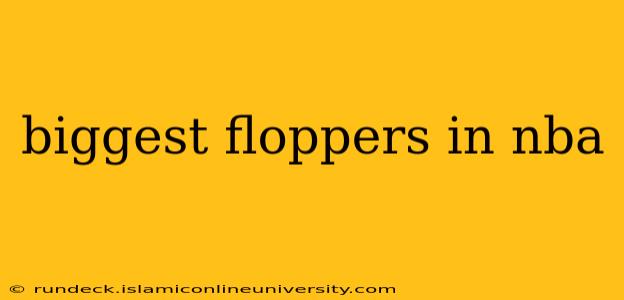The NBA, a league known for its athleticism, skill, and intense competition, also has a less glamorous side: flopping. This controversial tactic, where players exaggerate contact to draw fouls, has been a source of debate among fans, players, and officials for years. While some argue it's a clever strategic move, others see it as unsportsmanlike and detrimental to the integrity of the game. This article will delve into some of the biggest floppers in NBA history, examining the impact of their actions and exploring the ongoing battle against this deceptive practice.
Who are some of the most notorious floppers?
This question is subjective, as judging a player's propensity to flop relies on individual interpretation of game footage and personal bias. However, certain players have consistently drawn criticism for their perceived overuse of this tactic. Some names frequently mentioned include:
-
Chris Paul: Known for his exceptional court vision and playmaking, Paul has also been accused of embellishing contact on numerous occasions. His ability to draw fouls strategically is undeniable, but whether those fouls always reflect genuine contact is a matter of debate.
-
James Harden: Before his recent transition to a more mature style of play, Harden earned a reputation as a master of drawing fouls, often leaning into defenders to initiate contact. His "drawing fouls" game was a crucial part of his offensive arsenal, yet it was a highly contested aspect of his game.
-
LeBron James: Even arguably the greatest player of all time isn't immune to accusations of flopping. While not known for consistently flopping, there are several instances where his reactions to contact have been seen as overly dramatic by critics.
-
Draymond Green: A highly competitive and physical player, Green has occasionally been accused of using flopping as a way to disrupt opponents' rhythm and draw fouls.
It's crucial to remember that these players are among those most frequently cited as floppers, not definitively the worst. Perception is key here, and fans often judge based on their own team affiliations and personal preferences.
What are the rules regarding flopping in the NBA?
The NBA has attempted to curb flopping through various rules and penalties. Referees are empowered to assess a technical foul for obvious and excessive flopping. This can result in a loss of possession and potentially further penalties if a player commits multiple such offenses. However, enforcing these rules consistently is challenging, as the subjective nature of contact makes it difficult to determine intent.
How does flopping impact the game?
Flopping’s impact on the game is multi-faceted:
-
Game Flow: It can disrupt the natural rhythm of the game, leading to frequent stoppages and potentially influencing the outcome of close matches.
-
Refereeing Challenges: The inconsistency in calling flopping fouls presents a significant challenge for referees, placing them under intense scrutiny and increasing the potential for controversial calls.
-
Player Integrity: The practice raises questions about the integrity of the game and player behavior. Many believe it detracts from the athleticism and skill that should define the sport.
-
Fan Perception: It can frustrate fans and damage the overall viewing experience, leading to negative perceptions of both the players involved and the league as a whole.
Does flopping give a player an unfair advantage?
Yes, many argue that flopping grants an unfair advantage. By successfully drawing fouls, players can gain free throws, stop the opposing team's offensive momentum, and potentially secure a crucial victory. However, the perceived "unfairness" is deeply rooted in the subjectivity of the action and the difficulty in objectively determining intentional deception.
What is the NBA doing to address flopping?
While the league's current measures aren't perfect, the ongoing effort demonstrates a commitment to maintaining the game's integrity. Continual refinement of rules, increased referee training, and improved replay technology may offer potential solutions to mitigate this issue. Ultimately, a multi-faceted approach will be needed to effectively address the issue of flopping in the NBA.
The debate around flopping in the NBA is likely to continue. It's a complex issue with no easy solutions, highlighting the tension between strategic play and fair competition. As the league and its players continue to navigate this complex issue, one can only expect the conversation around flopping to remain a significant talking point within the NBA community.
